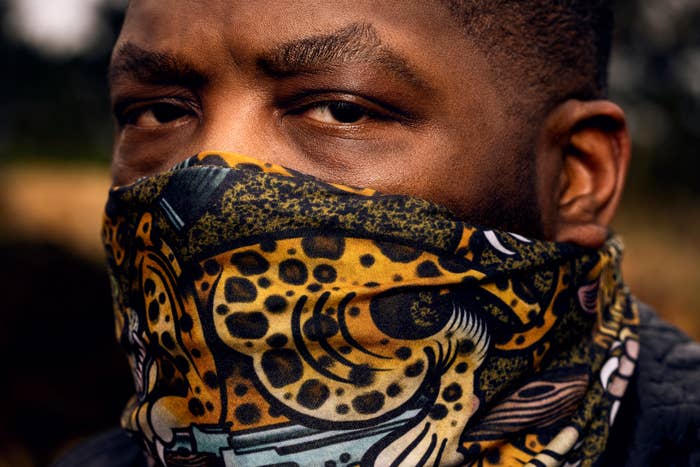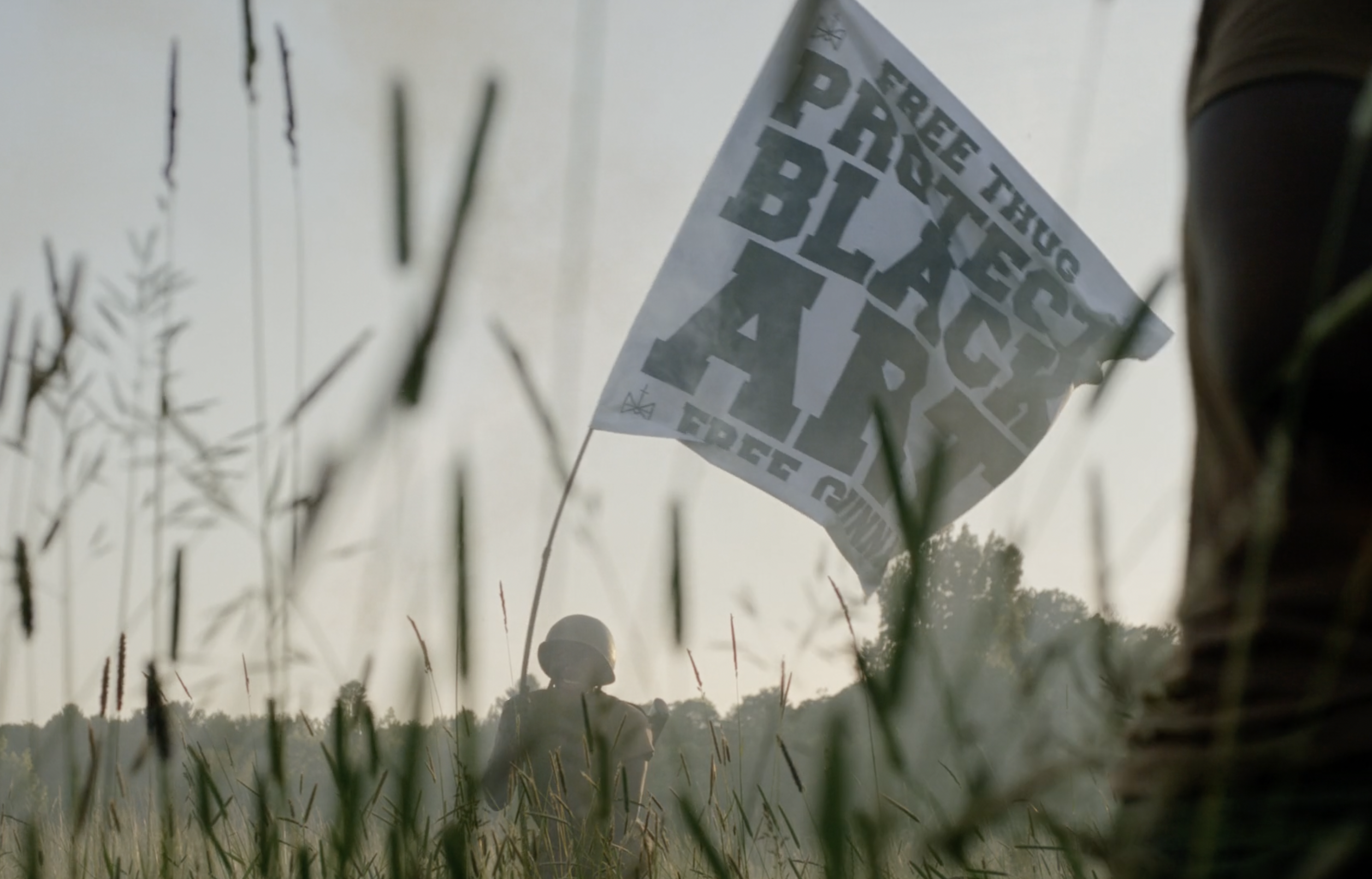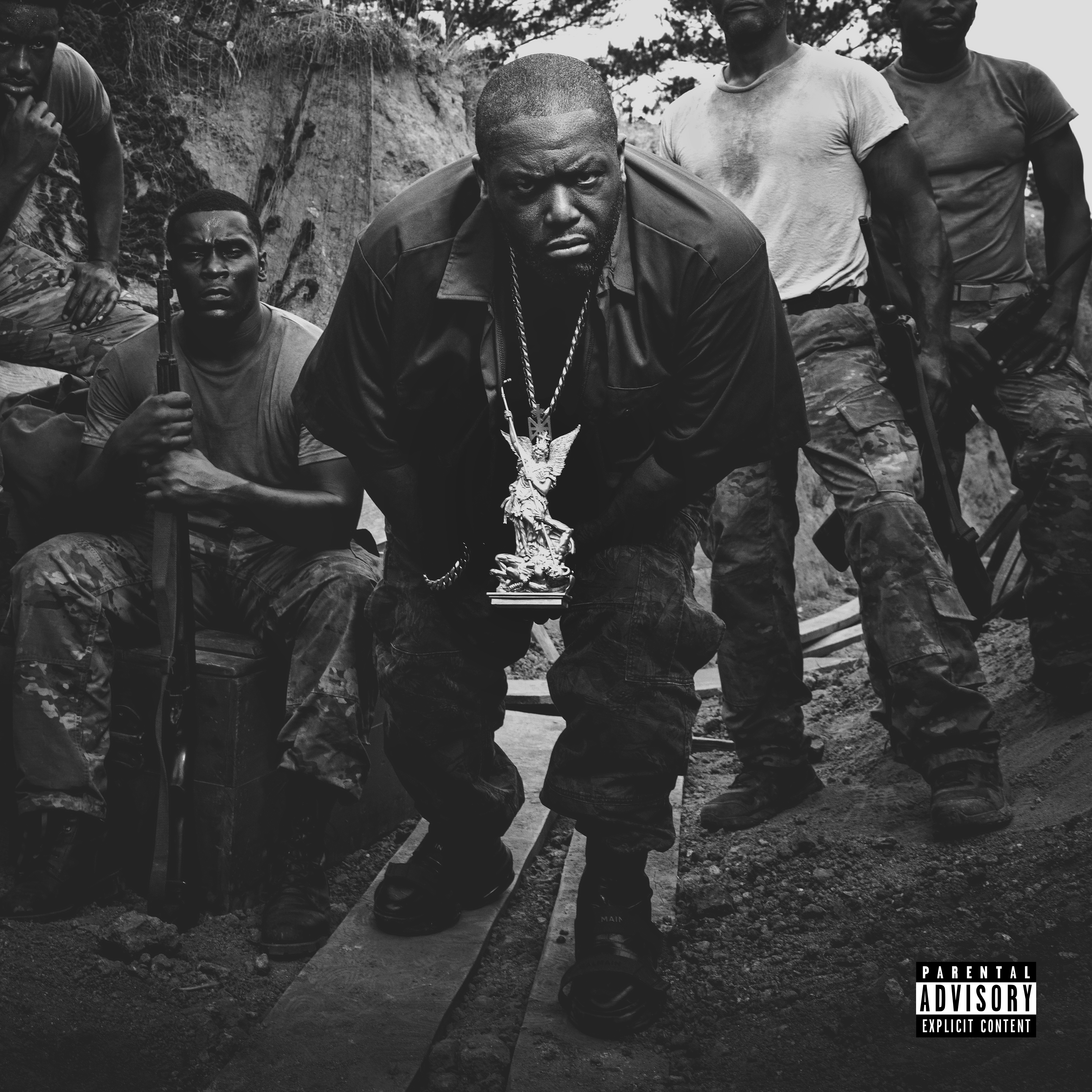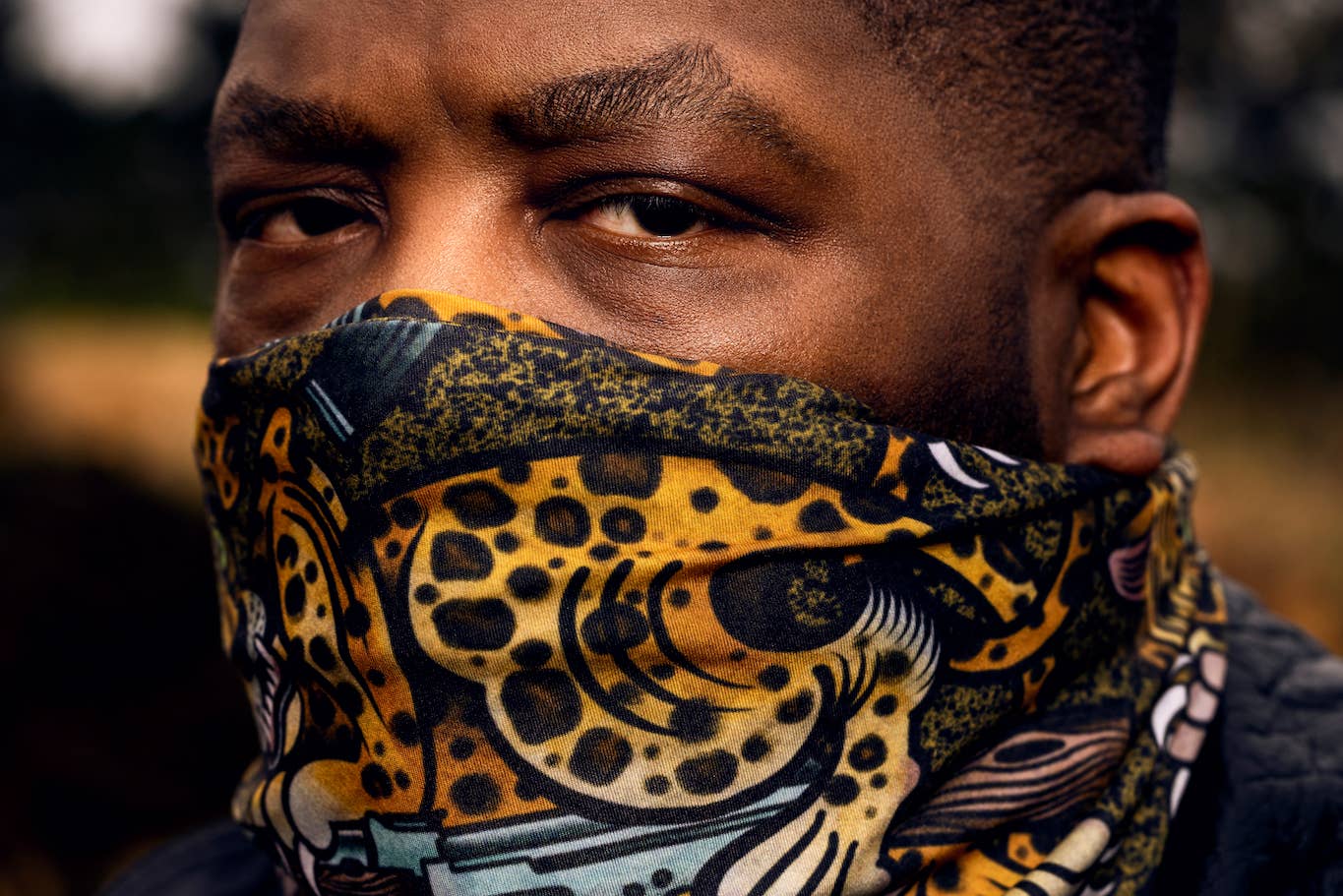
Too often is Black history and American history viewed as two distinctly different timelines when, in reality, they are deeply intertwined. Holidays like the Fourth of July have long been understood to be white-centric, but as Killer Mike cites, the first American to die during the Boston Massacre (which led to the Revolutionary War) was a Black man named Crispus Attucks.
“There would be no Fourth of July without a Black man, and the fact that Crispus Attucks was the first person to die on the behalf of what would become the republic called America,” Mike tells me, as we discuss why he chose to deliver his first solo track in 10 years, “Run,” on Independence Day. “The fact that all Americans don’t know that is a problem for me.”
Ever since Black people arrived in this country, we have played an intrinsic role in shaping American culture, economy, and infrastructure. Killer Mike has always been an advocate for Black liberation and a promoter of Black history in and out of his music, and “Run” continues to paint the picture of why he believes Black people deserve to feel just as patriotic as their white counterparts on the Fourth of July. The music video for the track drives that point home, including several historical Black figures who have played integral roles in contributing to American society as we know it today. “I wanted people to understand that patriotism is not exclusive to white people—this republic is not here simply because of white Anglo-Saxon protestants,” Mike explains. “You have been here every step of the way, in fact. Everyone has been here every step of the way.”
“Run” isn’t about running away from tyranny or our oppressors, instead depicting how Black people have run towards knowledge, freedom, and adversity, and faced it head-on. The track also finds Mike rapping for the first time in a decade without his Run The Jewels partner El-P by his side. The rap veteran explains that this solo venture is only a spin-off from his music in the duo, and he wanted it to sound totally different from his work in RTJ. “If Run The Jewels is the X-Men, this solo song represents a storyline that’s just Logan,” he says.
The No I.D.-produced song opens with soothing organ chords and narration from Dave Chappelle, like a Deacon ushering in the beginning of a church service. Later, we hear a rare Young Thug feature, which comes on the heels of the massive YSL indictment that has called the protection of Black art and the criminalization of rap lyrics into question. Killer Mike spent two weeks with Thug before they laid their verses down, and he says it’s not right that Thug, Gunna, or YFN Lucci are being penalized for song lyrics.
“I think we have a First Amendment right, and I think it should be hands-off Black art, so I support those brothers and their campaign to get a bond and get free,” Mike says. “Just a year ago, they were paying people’s bonds who couldn’t afford bonds to get out, and I see them as community leaders and providers of jobs for a lot of people.”
“Run” was released today, alongside a powerful music video directed by Adrian Villagomez that illustrates why we should never forget the efforts made by our ancestors to push our community forward, while also advocating for the protection of Black art. In the video, Black historical figures like Booker T. Washington, Frederick Douglass, Jack Johnson, Sojourner Truth, Fannie Lou Hamer, Shirley Chissem, Tommie Smith, and John Carlos appear at different moments on the battlefield, while the main character is backed by Black folk and allies alike to defeat white supremacists. The video culminates in a portrait of the battle being observed in a museum, reflecting how Black history has always been American history.
In conversation about his first solo work in 10 years, Killer Mike spoke with Complex about the importance of knowing and understanding Black history, the reclamation of Independence Day, and if fans can expect more solo music in the future. You can watch the music video and hear the song here.
“Run” opens with narration from Dave Chappelle and an organ playing in the background. It sounds like Chappelle is ushering in the beginning of a church sermon. Was that intentional, and why did you want him to introduce the track?
I haven’t done a solo record in 10 years, and I also grew up in a very Southern Baptist and Pentecostal background with my grandparents—my grandmother in particular. So in a lot of ways, this sound was a return back to church for me. I’m still not a follower of any Abrahamic religion, but I learned a lot of lessons through Christianity growing up, and I learned a lot about music in church.
On my return to solo music, I didn’t want to attempt to do Run The Jewels music minus my Run The Jewels partner. I’m a member of, to me, the greatest rap group in the world. We have a distinct sound, we tour relentlessly, we’re opening for Rage Against the Machine for the next couple of years, so I didn’t want to do a sound-alike. If Run The Jewels is the X-Men, this solo song represents a storyline that’s just Logan. I wanted it to have its own distinct sound and return to my Southern roots and church, so those organs were very purposeful.
With Dave, I went to one of his shows, and afterward all the comedians were hanging out. Everyone was telling funny stories, and the next thing you know, Dave is like, “Mike, you need to run for governor.” I was like, “We got somebody running for governor already,” and he just gives me this monologue backstage. I was like, “I like weed, I like strip clubs. Me and my wife might be out until 5 in the morning.” And he’s just like, “Nigga, we don’t care! We know your proclivities, we want you to run!” Then he gives me a speech that has me beaming afterward. Not that I wanted to run for office, but it helped me to have a greater understanding of what I represent for many in the culture—a truth-seeker, a truth-teller, and firmly on the side of the people. I was honored by that. I laughed like shit and I called him after we had done this record. I was like, “Yo, would you mind repeating that same speech you gave me? I have this record called ‘Run’ and part of the feeling of it would be enhanced if you did that.’ He sent it back to me, and it was as good as the night he cussed my ass out and told me to run for governor.
The record also features [Young] Thug, and I wanted people to pay close attention to the Thug, Gunna, and YFN Lucci case, as these young men are all in jail and they may have rap lyrics used against them in court, and I don’t think that’s fair. People should be presumed innocent until proven guilty, and that’s not only for Thug and Gunna, but someone who is presumed to be in opposition, as well, like YFN Lucci. I don’t think those three men should be in jail for the things that they’re accused of if their lyrics are only being used against them. I think we have a First Amendment right, and I think it should be hands-off Black art, so I support those brothers and their campaign to get a bond and get free. Just a year ago, they were paying people’s bonds who couldn’t afford bonds to get out, and I see them as community leaders and providers of jobs for a lot of people.
I spent two weeks hanging out with Thug, and he gave me that verse, which is amazing. My verse is a call-and-response style that people haven’t heard me do. I try to always switch up my packages of styles, so the song just came together like a piece of art. When you look at it in the video, it’s art-focused too, and I’m just happy to not only be on a record with Chappelle, on a record produced by No I.D., on a record with Thug, but [on a record that] means something.
“Free Thug, Free Gunna. Protect Black art for young Black artists that are coming up.”
The video is powerful, especially how the man is initially running alone, but as other people see him running towards something, they follow him. It seems symbolic of the idea that it only takes one person to start a movement. Was that the idea?
Exactly, and he wasn’t running away from anything. He was running towards something. Too many times, Black people in this country have approached our push for freedom as running from an evil or oppressor. The truth is, we’ve run toward freedom. We have run toward emancipating ourselves. We have run toward education and the betterment of ourselves. I’m glad you got that, because I didn’t want to have to explain that. That young man wasn’t running from anything—he was running toward something, and when other people saw him running toward it, they were invigorated by it to run with him and fight oppression with him, and to win. Not only did he run, we won in the end, and that’s what it’s about to me.
I am not able to hold a narrative that we’re simply victims and serve at the whim of those more powerful than us. Every step of the way since 1619, we pushed and resisted and urged. Right now, we’re fighting for a First Amendment right again after Luther Campbell. Many people know Luke for coaching football or having people drop it like it’s hot as a member of the 2 Live Crew, but he fought for all of our First Amendment rights, and that’s everybody from condescending news reporters on television to politicians who try to limit our First Amendment rights now. People need to know that Luther Campbell fought that fight as well. For me, this is a celebration of the African American experience here, and our victories over whatever had plagued us or stood in our way.

Another thing that caught my attention is the Fourth of July release date. That choice made me think of Langston Hughes’ poem “I, Too.” Why drop “Run” now instead of Juneteenth or another date?
There would be no Fourth of July without a Black man, and the fact that Crispus Attucks was the first person to die on the behalf of what would become the republic called America. When people argue about [Critical Race Theory] and stuff like that, they’re arguing over something that you learn in law school, post-undergrad, and how systems have been formed to oppress you. Meaning: redlining in Chicago, refusing to insure Black homeowners in Atlanta early on. That’s CRT, and that’s something for the more mature mind.
What I advocate for is: Why aren’t all American children learning about Frederick Douglass? He was one of the greatest diplomats of our time. Why aren’t they learning about Booker T. Washington or W.E.B. Du Bois? All of these people are Americans that greatly contributed to the greatness of this republic in this country. The first person to die in the Boston Massacre was a Black man named Crispus Attucks—he was the first person to take a bullet. The fact that all Americans don’t know that is a problem for me. We’ve contributed greatly to this republic, and it amazes me when you get on Twitter and people say, “Well why do Black people get a Black history month?” Because your ass won’t teach true history all year. You get the comfort of thinking George Washington cut down a fucking cherry tree and you get to remain in this blissful ignorance and you never have to confront the fact that since 1619, Blacks have been here contributing to this republic. You have to say to yourself that in 1776, the person that went to war for us first was a Black man.
I wanted people to understand that patriotism is not exclusive to white people—this republic is not here simply because of white Anglo-Saxon protestants. You have been here every step of the way. In fact, everyone has been here every step of the way, whether it was a mass Chinese immigration years ago or the floodgates of Ellis Island for Italians and Irish people before they were deemed white; they were an ethnic group that had to serve themself. So for me, it’s about true patriotism. On July 4, the day where Black folks eat hot dogs and drink beer and a lot of white folks wear the American flag on their clothing, I want us to get an opportunity to say, “Hey, in case you didn’t learn this in high school, we need you to understand that this is a part of the greater American experience. And you’re a part of it. Black history month shouldn’t just be celebrated and supported by Black folks—find you somebody Black that you like. If you’re a conservative, celebrate Walter E. Williams. If you’re liberal, celebrate your Frederick Douglass, W.E.B. Du Bois, Malcolms, and Martins. Celebrate Mutulu Shakur. celebrate Assata Shakur who’s still on the run because she fought for something on the behalf of all of us. I refuse to not let us be a part of this experience because we’ve been a part of building this motherfucker.
“I wanted people to understand that patriotism is not exclusive to white people—this republic is not here simply because of white Anglo-Saxon protestants.”
Speaking of historical Black figures, there are several in the music video. Why did you choose to include them?
We are here because of the work of our ancestors. For me, my great grandparents were the sons and daughters of slaves, worked and became sharecroppers, bought their own farm, and that farm is still in our family today. I cannot acknowledge being a successful anything without acknowledging my ancestors who laid it down before me. When you see women talk about the women’s suffrage movement or womanism as defined by Alice Walker, you have to talk about Shirley Chisholm. You have to talk about Fannie Lou Hamer and Sojourner Truth, and I mean as an American. Forget that I’m a part of the ethnic group of Black people. Sojourner Truth was not only an emancipator of Black people, she was 100 years ahead of her time with women’s suffrage, and Frederick Douglass was too. He’s in the video and he historically said that Black men and women deserve the right to vote 100 years prior to women getting the right to vote and Blacks. We have been far more progressive in this country for the betterment of us all for a long time. When you look at Booker T. Washington, he had the students who were going to Tuskegee to build the bricks and the colleges themselves, so our colleges shouldn’t just have bachelor’s degrees and artistic things, we should have trade skills taught in our colleges and high schools as well. All of these Americans in the video have fought for all of our rights, and they happen to be Black. It was power to the people, but to all the people. It was a Fred Hampton-like experience, where Fred Hampton understood that racism and the caste system were made to enforce classism. The first Rainbow Coalition was about people from multi-ethnic groups getting together and fighting for their rights as a unit. That’s what Hampton taught us. So for me, it was important that when you see our hero in the video running into battle for us, he’s encouraged and standing on the shoulders of giants, which were our ancestors.
I didn’t want our ancestors to be forgotten in this. I don’t like the shirts that say, “I’m not my grandparents, I got these hands.” You ain’t got shit, your grandparents fought like hell. The people that were hung were the people that pushed back. Our ancestors deserve to be honored and the American ancestors for pushing this republic progressively deserve to be honored, so those people represent that spirit in this video. That runner represents the heroism of our experiences in this country, and when you look at the troops who follow behind him, it’s not just Black folks—our allies are represented, too. Nat Turner is one of my heroes for rebelling, as is John Brown. I had a white friend who didn’t know who John Brown was, and it’s amazing because it’s the ignorance that’s allowed in this country that doesn’t allow us to fully fuse together as a proletariat, because they teach us that we’ve always been at odds and been apart. And that’s not true. There are many people who have fought for the betterment of us all, and I want us all duly recognized.



